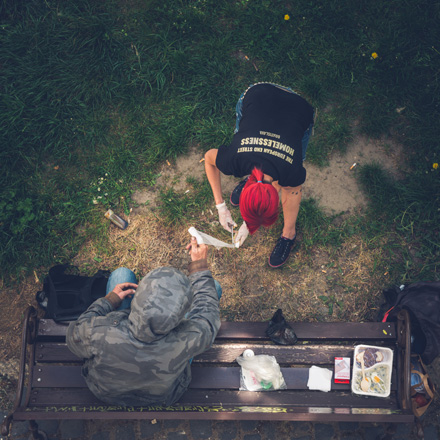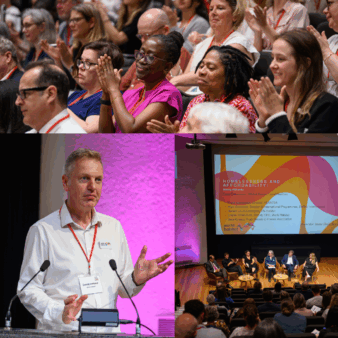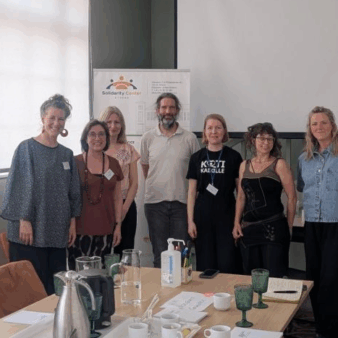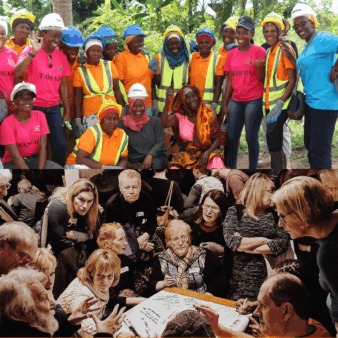
Thousands of homeless people across Europe have been provided with safe accommodation and life-saving medical care, as local authorities, NGOs, local community volunteers and public health institutions have come together to provide an emergency response to the COVID-19 crisis. This remarkable action – that has taken place in cities which are part of the European End Street Homelessness Campaign – has resulted in relatively low rates of COVID-19.
In a report – Responding to the COVID-19 Pandemic: Case Studies from the European End Street Homelessness Campaign – published today by World Habitat, there are details of how organisations (including local authorities, NGOs, campaign partner organisations) and individuals have worked together to implement emergency measures to COVID-19, as the lockdown and ‘stay at home’ rules were impossible for homeless people to adhere to.
This report highlights the key actions taken in these cities – up to the end of May – as well as the outcomes, the resulting challenges and important learning for future action. This includes:
- in Barcelona, over 200 people have been housed and have received social support from staff at campaign partner organisation Arrels;
- in Bratislava, campaign partner organisation, Stopa, extended their services to 90% of the city, as many social services had closed down. After two weeks they had the three biggest areas covered by their outreach teams and were in contact with more than 500 rough sleepers;
- in Brighton, around 220 people who were formerly rough sleeping have been accommodated in hotels by the local council, with access to health support, daily welfare and symptom checking and rapid access to a substance misuse service. Campaign partners Galvanise BH supported this community effort by co-ordinating food deliveries, fundraising and collecting donations;
- campaign partner organisation in Brussels – Infirmiers De Rue – launched a global call to #ProtectTheUnhoused, bringing together a commitment of over 80 organisations across the world, in calling for people who are street homeless to be protected from the consequences of COVID-19;
- in Croydon rough sleepers were provided with safe accommodation despite a 500% increase in those referred to the outreach team in the early weeks of lockdown;
- 19 homelessness organisations in Scotland, including Homeless Network Scotland – the lead campaign partner organisation in Glasgow – formed a collective to campaign for housing to be at the heart of Scotland’s national recovery from COVID-19, under the banner ‘Everyone Home’;
- a total of 130 people have been housed in hotels and student accommodation in Leicester; 40 people have been moved out of bed and breakfast spaces to more supportive accommodation, including over 20 to permanent homes;
- Torbay Council have accommodated around 200 households including 165 single people who were at risk of street homelessness; and
- more than 500 people have been moved off the streets into hotels in Westminster, London – the offer was made to anyone rough sleeping even if they had No Recourse to Public Funds (NRPF).
Robert White, the Commissioning Manager of the Westminster City Council Rough Sleepers Team, said:
“The work of the service providers, health teams, volunteers, faith networks, Police, Greater London Authority, MHCLG and my Westminster City Council commissioning team colleagues has been phenomenal. Collectively we have supported an unprecedented number of rough sleepers away from the street and out of unsafe environments into apartments and hotel spaces in Westminster and across London.
“Our existing accommodation pathway has worked tirelessly to keep their residents safe. Our day and night services have completely repurposed, staff have moved away from their familiar settings and into running major projects within the hotels. Our outreach teams have worked day and night to meet vulnerable rough sleepers, some we know, some we have never met. They have managed to get over 500 people – and counting – indoors.”
Patrick Duce, Programme Lead for Homelessness at World Habitat, said:
“Although the organisations working in our campaign cities have their own distinct local housing contexts, this report illustrates the shared challenges that every city has faced. Effective and dynamic co-operation – between homelessness service providers, local authorities, charities, and volunteers – has been critical to providing the rapid response, which was essential to save lives.
“Flexibility was also vital – all partners across our European End Street Homelessness Campaign have adapted their ways of working, quickly, to ensure that they could continue to support people experiencing homelessness, whilst also protecting both staff and clients.
“As vital and impressive as the initial outcomes have been, what are equally as crucial are the learnings from the first few months of the COVID-19 pandemic detailed in this report. These will help to influence future responses and help to minimise future risks where possible.
“However, the most urgent need is to ensure that homeless people are not returned to the streets and instead found safe and secure homes, from where they can start to rebuild their lives.”
Responding to the COVID-19 Pandemic: Case Studies from the European End Street Homelessness Campaign is available as a free download.
Read Celeste Sangster’s blog for her analysis of the incredible responses to the COVID-19 pandemic in campaign cities across Europe and how it’s an opportunity to end street homelessness for good.
Image: Marek Janos




Join the discussion